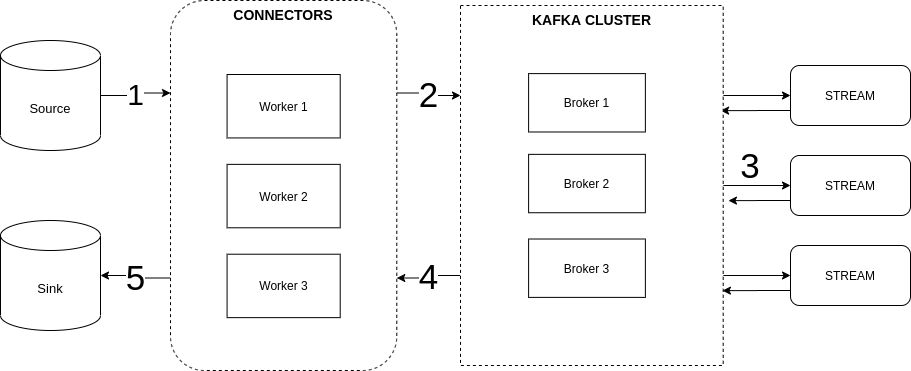- Linkedin profile Contact me if you have any questions or joining contributors
A publisher or multiple publisher write messages to many partitions and single or multiple consumer groups consume those messages.
Consumer group is a group of consumers, it can parallelise the data consumption.
When a new consumer joins to consumer group or remove a consumer, rebalancing happen
Consumer group coordinator implement rebalacing strategy and manage the state of the group. It auto rebalace message to appropriate consumer in each consumer group
Producer cmd
go run ./cmd/producer/producer.go --topic topic-name --partitions 1 --replicas 1
You have to config kafka cluster when change number paritions and replicas > 1
In case, you want to modify topic configuration manually after setting up kafka cluster, you can use kafka-cli to execute:
Add new topic
docker-compose exec broker kafka-topics --create --topic youtube --partitions 3 -replication-factor 3 --bootstrap-server broker:9092
Alter exist topic
docker-compose exec broker kafka-topics --alter --topic youtube --partitions 3 -replication-factor 3 --bootstrap-server broker:9092
Kafka doens't support reducing the number of paritions for a topic
Consumer cmd
go run ./cmd/consumer/consumer.go --topic topic-name
A simple streaming model to collect videos data and sync data between POSTGRESQL and ELASTICSEARCH
Prepare connector image The kafka connect base image only contain a few connectors. To add new connector, you need to build a new docker image that have new connectors installed.
Docker file
FROM confluentinc/cp-kafka-connect-base:6.0.0
RUN confluent-hub install --no-prompt confluentinc/kafka-connect-elasticsearch:10.0.1
Build
docker build . my-connect-image:1.0.0
Prepare connector config
{
"name": "elastic-sink4",
"config": {
"connector.class": "io.confluent.connect.elasticsearch.ElasticsearchSinkConnector",
"key.converter": "org.apache.kafka.connect.storage.StringConverter",
"value.converter": "org.apache.kafka.connect.json.JsonConverter",
"value.converter.schemas.enable": "false",
"errors.retry.timeout": "-1",
"topics": "youtube2",
"connection.url": "http://elasticsearch:9200",
"type.name": "_doc",
"key.ignore": "false",
"schema.ignore": "false",
"transforms": "ExtractTimestamp",
"transforms.ExtractTimestamp.type": "org.apache.kafka.connect.transforms.InsertField$Value",
"transforms.ExtractTimestamp.timestamp.field": "timestamp"
}
}
Insert connector configuration
./run.sh
Detail at https://docs.confluent.io/current/connect/managing/extending.html
Create ksql stream
CREATE STREAM youtube (
kind VARCHAR,
etag VARCHAR,
id VARCHAR,
snippet MAP<VARCHAR,VARCHAR>
) WITH (
KAFKA_TOPIC='youtube2',
VALUE_FORMAT='JSON'
);
Query elasticsearch
curl -X GET "localhost:9200/_search?pretty&size=100" -H 'Content-Type: application/json' -d'
{
"query": {
"match_all": {}
}
}
'
When a kafka client connect to one of brokers, it will auto connect to entire kafka cluster brokers. Kafka broker call bootstrap server.
Zookeeper responsible for managing kafka brokers, it perform partition leader election, and in-sync-replicas. Furtherly it informs to Kafka if any configurations change happen (such as topics, paritions...).
In production environment, you need to config Zookeeper Cluster too
Environment
KAFKA_ZOOKEEPER_CONNECT: 'zookeeper:2181'
KAFKA_LISTENER_SECURITY_PROTOCOL_MAP: PLAINTEXT:PLAINTEXT,PLAINTEXT_HOST:PLAINTEXT
KAFKA_ADVERTISED_LISTENERS: PLAINTEXT://broker2:39092,PLAINTEXT_HOST://localhost:9093
You should notice to these env variables, it defines internal network and external network publish to client
Producer sends bytes to kafka cluster, the consumers don't know any data that the producer sends, it has no verification and will break the consumer. In a distributed system it becomes very hard for evolving microservices and break consistency between other teams. That's why schema registry was created.
Schema registry provides restful interface for storing and retriving Avro, JSON, Protobuf schema between producer and consumer
List all subjects
curl -X GET http://localhost:8081/subjects
Example result:
["Kafka-value","Kafka-key"]
Get schema registered version of subject
curl -X GET http://localhost:8081/subjects/${subject-name}/versions/1
Delete schema version of subject
curl -X DELETE http://localhost:8081/subjects/${subject-name}/versions/1
Avro schema form includes 4 fields: type, namespace, name, fields
{
"type": "record",
"namespace": "com.example",
"name": "FullName",
"fields": [
{ "name": "first", "type": "string" },
]
}
Primitive Data Types int, long, float, double, string, null, bytes, boolean
Complex Data Types record, enum, array, map, unions, fixed (fixed-sized field)
"record" represents an object
{
"type": "record",
"namespace": "com.example",
"name": "FullName",
"fields": [
{ "name": "first", "type": "string" },
]
}
"enum" defines enumerated values
{"type": "enum", "symbols": ["A", "B","C"]}
"array" defines an array fields with a type
{"type": "array", "items": "string"}
"map" defines key, value pairs. The key must be a string
{"type": "map", "values": "string"}
"unions" define a list of variable types
{"type": ["int", "string", "null"]}
Logical Data Types supported in Avro version 1.7.7 Provides more meaning with existing primitive types
- decimal (bytes)
- date (int)
- time-milis (long) number of miliseconds after midnight
- timestamp-milis (long) number of miliseconds from unix epoch
{"type": "int", "logicalType": "decimal"}
5. Connect
Kafka Connect is used for streaming data between Kafka and other data system. It's simple, low latency, reliable and scalable. Kafka Connect can push large data sets in and out of Kafka. It becomes an integral component of ETL pipeline when combined with Kafka and streaming processing framework.
List of available connectors: https://www.confluent.io/hub Kafka connect with schema registry: https://docs.confluent.io/platform/current/schema-registry/connect.html
Create a new connector
curl -X POST http://localhost:8083/connectors -H "Content-Type: application/json" -d @source/distributed/connector-json.json
Get connector information
curl -X GET http://localhost:8083/connectors/${connector-name}
There are 2 types of worker configuration: standalone mode and distributed mode
Standalone Mode is a single process that run connectors and tasks. For development purposes only.
Distributed Mode is multiple worker that run connectors and tasks, it's scalable and fault tolerant. If a worker dies, rebalance happen, tasks will be delivered to other workers. Use for production.
The source connector gives you the way to import data from any data sets and write to kafka topic
Create a new source connector
curl -X POST http://localhost:8083/connectors -H "Content-Type: application/json" -d @source/distributed/connector-json.json
Example JDBC source connector
connector.class=io.confluent.connect.jdbc.JdbcSourceConnector
timestamp.column.name=[column_name1]
incrementing.column.name=[auto_increment_column]
table.whitelist=orders
mode=timestamp
topic.prefix=postgresql-source-connector-
connection.url=jdbc:postgresql://postgres:5432/postgres
connection.user=postgres
connection.password=password
key.converter.schemas.enable=false
value.converter.schemas.enable=false
value.converter=org.apache.kafka.connect.json.JsonConverter
key.converter=org.apache.kafka.connect.json.JsonConverter
The Kafka sink connector allows you to export data from Kafka to any data sets
Create a new sink connector
curl -X POST http://localhost:8083/connectors -H "Content-Type: application/json" -d @sink/distributed/elastic-json.json
Example Elastic sink connector with json schema less
connector.class=io.confluent.connect.elasticsearch.ElasticsearchSinkConnector
type.name=_doc
errors.retry.timeout=-1
topics=postgresql-source-connector-orders
transforms=ExtractTimestamp
key.ignore=true
schema.ignore=true
transforms.ExtractTimestamp.type=org.apache.kafka.connect.transforms.InsertField$Value
value.converter.schemas.enable=false
value.converter=org.apache.kafka.connect.json.JsonConverter
connection.url=http://elasticsearch:9200
key.converter=org.apache.kafka.connect.storage.StringConverter
transforms.ExtractTimestamp.timestamp.field=timestamp
Query Elastic data
curl -X GET "localhost:9200/_search?pretty&size=100" -H 'Content-Type: application/json' -d'{"query":{"match_all":{}}}'




